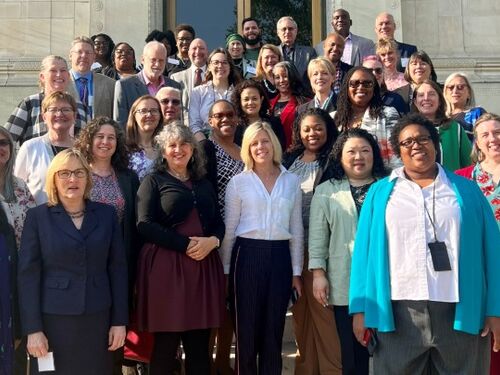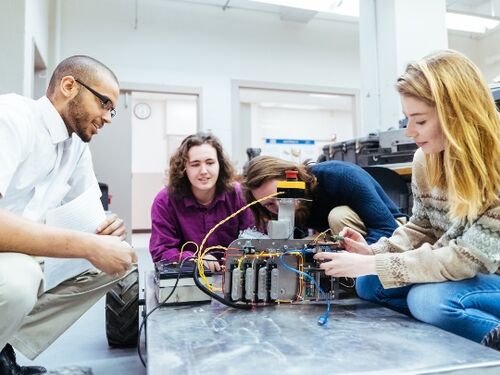Roundtable on Systemic Change in Undergraduate STEM Education
The Roundtable fosters ongoing discussion of the challenges to and strategies for improving undergraduate STEM education among federal officials, the business community, policy makers, educators, and academic scientists, mathematicians, and engineers. It uses foundational knowledge of the evidence base on pedagogy and systemic change in higher education to inform and advance reform efforts.
Areas of focus include supportive pathways to STEM learning and STEM careers, humanizing STEM education and making the STEM culture more inclusive, transition and transfer, professional learning and incentives for the instructional workforce, and the thoughtful use of data to inform educators and leaders of systemic change.
In progress
STEM is a part of daily life and therefore important for all students and all people. Considering the overall system for transition from high school to STEM education and workforce and thinking about who is included/encouraged/prepared to take which pathways and who is left out we can better identify the evolving skills needed by future workers and citizens. The Roundtable is working to connect stakeholders across communities and sharing ways that groups have used to improve links between higher education and K–12 education, informal science education, government decision makers, and non-profit community groups, and employers.

Caring institutions are those that see students as complex people juggling varied priorities and demands, recognize the variety of assets that students of different backgrounds bring to their education, and challenge traditional assumptions about prerequisites, remedial/developmental education, and grading. Our work includes an intentional focus on how academia conceives of the responsibilities of institutions, departments, faculty, and staff to welcome, support, and advance all students in STEM learning. This includes learning from successes at minority serving institutions.

The Roundtable uses systemic thinking to advance understanding of postsecondary learning and works on ways to share this systemic thinking with leaders and other stakeholders. This includes educating postsecondary stakeholders on current approaches to and language for tackling issues of diversity, equity, inclusion, accessibility, and justice and exploring the role of data in informing thinking and decision-making. Current efforts focus on helping to show how change has happened (not just the end result of the change).

Our mission
Areas of focus include supportive pathways to STEM learning and STEM careers, humanizing STEM education and making the STEM culture more inclusive, transition and transfer, professional learning and incentives for the instructional workforce, and the thoughtful use of data to inform educators and leaders of systemic change.
The Roundtable drives a national effort on strategies for educating postsecondary learners to become informed members of society and to have opportunities to learn skills and concepts that will facilitate future participation in the STEM workforce.
The Roundtable has collaborated with partners to lead a collection of activities on recognizing and evaluating STEM teaching in higher education that include a workshop and a national dialogue.
Roundtable members have published an instructional workforce framework that provides guidance for change agents on how to engage with, support, and seek to improve conditions and practices for and with those who teach undergraduates.

The Roundtable is led by co-chairs Mark Mitsui, president emeritus of Portland Community College, and Ann Austin, a higher education scholar at Michigan State University.
Roundtable members contribute expertise from varied roles in and around academia, including industry, government, and scientific and educational associations and societies. Faculty, department chairs, deans, provosts, chancellors, and presidents have participated from community colleges, liberal arts colleges, regional universities, and research universities. Members have taught at HBCUs, TCUs, AANAPISIs and HSIs. View committee.

The Roundtable uses the evidence base on pedagogy and systemic change in higher education to inform and advance reform efforts. We foster ongoing discussion about the challenges to and strategies for improving undergraduate STEM education among federal officials, the business community, policy makers, educators, and academic scientists, mathematicians, and engineers. We welcome participation from all of these stakeholder groups, especially at our public workshops usually held in May and October.
About Working with the National Academies
Looking for independent, nonpartisan guidance from the nation’s top subject-matter experts? We stand ready to help potential sponsors across a variety of sectors shape research and policy agendas, regulation, investments, operations, state and local initiatives, and more.
Contact us to learn more about how to engage with the roundtable:

Description
The Roundtable on Systemic Change in Undergraduate STEM Education will enable leaders from across the STEM policy, research, and implementation communities of higher education to 1) learn from each other's efforts, 2) work more efficiently to address complex issues related to undergraduate STEM education, and 3) make collective decisions about future policies and priorities as well as plan their own work based on deeper understanding of the perspectives of other stakeholders in the system. The Roundtable will foster ongoing discussion of the challenges to and strategies for improving undergraduate STEM education among federal officials, the business community, policy makers, educators, and academic scientists, mathematicians, and engineers. It will provide major federal and national stakeholders with the foundational knowledge of the evidence base on systemic reform in higher education while fostering ongoing interdisciplinary discussions by gathering experts from the major stakeholder groups. Roundtable members will learn from each other and other invited experts about broad systemic issues such as policies and practices that can facilitate or impede reform, effective approaches to supporting students' learning and engagement, the needs of faculty members as such efforts move forward, how institutional leaders can encourage and support improvements, and strategies for identifying and generating resources to support reforms.
The major goals of the Roundtable are to:
• make participating members aware of current evidence across multiple disciplines that can be used to guide systemic reforms in undergraduate STEM education (USE).
• provide a formal mechanism for ongoing collaboration and communication among stakeholders.
• advance discussion among stakeholders about systemic changes which can improve USE at the state and national levels including articulation of challenges; identification of leverage points; and identification of the appropriate roles for federal, state, local, private, and non-profit organizations and institutions.
• develop mechanisms to scale the implementation and dissemination of key findings/recommendations emerging from the portfolio of consensus studies being led by the Board on Science Education (BOSE) and the Board on Higher Education and the Workforce (BHEW) in the area of STEM education. All activities of the Roundtable will be conducted in accordance with institutional guidelines described in "Roundtables: Policy and Procedures," and separate GBEC approval will be sought for any workshops under the Roundtable.
Contributors
Committee
Co-Chair
Member
Member
Member
Member
Member
Member
Member
Member
Member
Member
Member
Member
Member
Member
Ex Officio Member
Ex Officio Member
Ex Officio Member
Ex Officio Member
Ex Officio Member
Sponsors
National Science Foundation
Staff
Kerry Brenner
Lead
Beth Cady
Lauren Ryan
Major units and sub-units
Center for Health, People, and Places
Collaborator
Center for Advancing Science and Technology
Lead
National Academy of Engineering Office of Programs
Collaborator
Science and Engineering Education and Workforce Program Area
Lead
Life Sciences and Biotechnology Program Area
Collaborator
Discover
Events
Right Now & Next Up
Stay in the loop with can’t-miss sessions, live events, and activities happening over the next two days.
NAS Building Guided Tours Available!
Participate in a one-hour guided tour of the historic National Academy of Sciences building, highlighting its distinctive architecture, renowned artwork, and the intersection of art, science, and culture.
